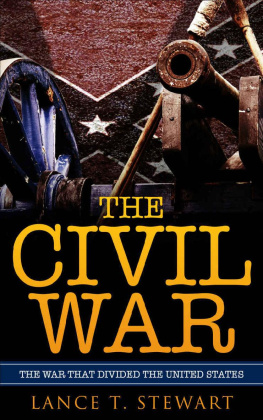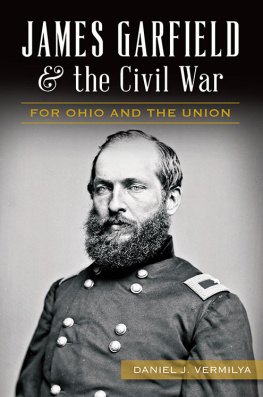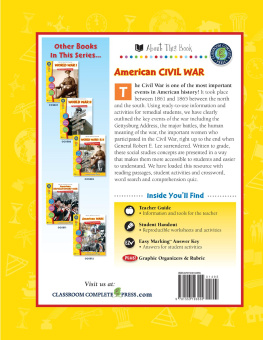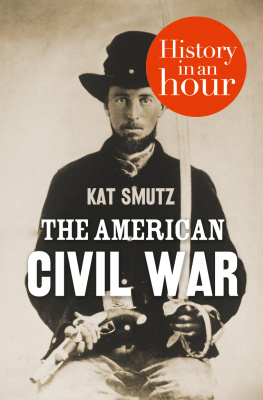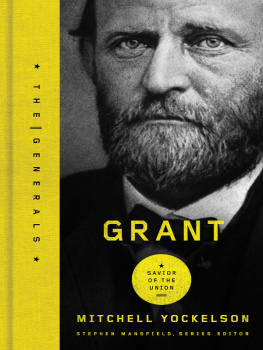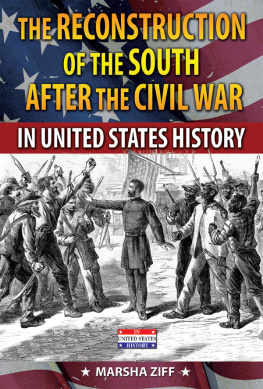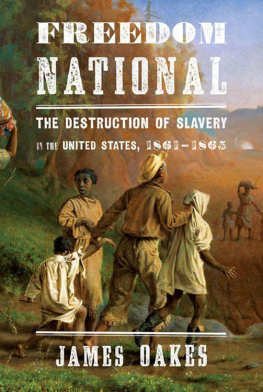The Civil War
The War that Divided the United States
By Lance T. Stewart
Copyright 2016 by Make Profits Easy LLC
profitsdaily123@aol.com
Table of Contents
Introduction
From whence shall we expect the approach of danger? Shall some trans-Atlantic military giant step the earth and crush us at a blow? Never. All the armies of Europe and Asia...could not by force take a drink from the Ohio River or make a track on the Blue Ridge in the trial of a thousand years. No, if destruction be our lot we must ourselves be its author and finisher. As a nation of free men we will live forever or die by suicide.
Abraham Lincoln
Myths About the Civil War
What do you think you know about the Civil War? If you remember what you learned in your high school history class, you probably know that the southern states fought the northern states in a number of horribly bloody battles. You might even remember the names of a few of the more famous battles, like Antietam, or Gettysburg. You know that Abraham Lincoln freed the slaves and was assassinated by John Wilkes Booth. But what else have you learned about the Civil War since you left school?
There are a lot of popular myths and misconceptions about the Civil War that get printed in books or in Internet blog posts and lists by careless writers repeating hearsay as fact. Why does this happen? Well, for one thing, the Civil War continues to fascinate Americans. Apart from the Revolution, it is the only war ever fought on American soil, and considering that it happened just one hundred and fifty years ago, theres a good chance that youve met someone whose grandparents were alive when it happened. In fact, the last known veteran of the Civil War didnt die until 1965so if you were born before that year, it is possible that you yourself have met someone who wore the Union blue or Confederate grey in your lifetime.
There is also the fact that the Civil War changed the nation in a number of ways, many of which still have a direct impact on the society that Americans live in today. Prior to the Civil War, a person from South Carolina would think of him or herself as a South Carolinian first, and as an American second. After the war, state loyalty became a secondary matter to national identity. Writer Shelby Foote notes that U.S. ambassadors and representatives abroad used to refer to the country as these United States before the war; only after the war did they begin referring to the United States. Before the Civil War, the country was polarized north and south; after the south was defeated, and more and more Americans began settling the frontier, the axis shifted east and west.
Then there is the lingering impact which the Civil War had on the lives of black Americans and of whites living in the south. This is perhaps the most significant factor that affects our ability to examine the Civil War objectively, and that sometimes gives rise to popular misinformation on the subject. Slavery was technically illegalized by the wars end, but for many years in the south it continued in practice. Between the end of the Civil War and the outbreak of World War II, hundreds of thousands of blacks in the south were forced to work for rich white farmers because they had been falsely arrested under the black codeslaws which were purposefully designed to ensure that most blacks were breaking the law just by existing. The lives and movements of blacks in the south were, for many years after slavery ended, controlled nearly closely as when they had been slaves. Every southern state except for Arkansas and Tennessee had laws like this in place during the late nineteenth and early twentieth centuries. Not until after the Civil Rights Era of the 1960s did blacks in the south begin to see a degree of genuine legal equality with whites. But the systematic racism that is still present in the United States is a direct consequence of slavery and of the legal inequities that blacks faced for decades afterward. Examining racism makes many people uncomfortable, and that discomfort has given rise to popular myths about the Civil War, such as that the Confederate states seceded because of issues like tariffs and states rights. As we will discover in this book, however, slavery was far and away the most important political issue in the United States in the decades leading up to the war, and it was unquestionably the reason that the southern states attempted to leave the Union.
What are the other myths about the Civil War? One of them is that the North went to war with the South to end slavery. While it is perhaps understandable to conclude that if the South fought to preserve slavery, the North must have fought to abolish it, that is not precisely the case. Most people in the North were content for slavery to exist in the south, and only wanted to prevent slavery from spreading into the newly acquired American states and territories in the westnot because they considered slavery to be wrong, but because they did not want less wealthy white settlers to have to compete with the free labor that slave owners would bring with them if they were to settle in the frontier with their human property. True abolitionists were a small minority in the nineteenth century. Even Abraham Lincoln felt that the purpose of the war was to preserve the Union and prevent the southern states from forming their own country. Ending slavery was a secondary goal to ending secession.
The Civil War is a dividing line in the history of the United States. It is important to remember that when the war broke out, the nation was only a few decades old. The generation of people that fought and witnessed the Civil War were the children and grandchildren of the generation that fought the Revolutionary War. When Abraham Lincoln served his term in Congress as a Representative from Illinois, he served alongside John Quincy Adams, son of John Adams, one of Americas founding fathers. Why is this important? Because the societal issues that led to the war did not arise suddenly just before Confederate soldiers fired on Ft. Sumter in April of 1861. They were the same issues that John Adams and Thomas Jefferson were debating when the U.S. Constitution was draftedissues that most of the founding fathers recognized had the potential to tear the country apart. In the eighty years that passed between the drafting of the First Amendment and the passing of the Thirteenth Amendment, sectional conflicts between north and south grew more and more divisive, until war seemed the only possible outcome. The United States that we know today was birthed, not in 1776, but in 1865. And in order to better understand the conflicts that divide the United States today, one must gain a deeper appreciation of the fact that they are the same conflicts Americans have been wrestling with throughout the nations historythat, indeed, they were present from the moment the United States came into being.
*
We tend to find wars easier to understand when there are clearly defined villains and heroes, with one side of the conflict being obviously in the right and the other side simplistically in the wrong. In some cases, it seems easy to make this kind of distinction: for instance, we tend to think of the second World War primarily in terms of the genocidal Nazis and their allies versus the rest of the world, all of whom understood that the Nazis were evil. Aspects of the conflict that are difficult to reconcile with this narrative, such as the fact that the United States imprisoned thousands of its own citizens who were of Japanese descent in internment camps, tend to be conveniently overlooked or dismissed. Likewise, on its surface, the American Civil War appeared to be a straightforward, morally motivated conflict, because it resulted in the abolition of slavery. But the truth is much more complicated, and though heroic actions and individuals are present in the historical record, the agendas that motivated the war on both sides had little to do with moral concerns of any kind.
Next page
